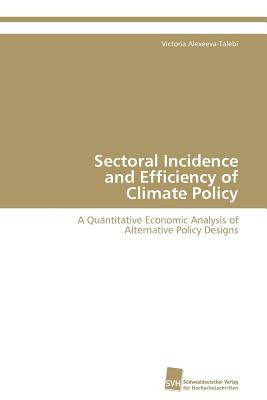
- We will send in 10–14 business days.
- Author: Alexeeva-Talebi Victoria
- Publisher: Sudwestdeutscher Verlag Fur Hochschulschriften AG
- Year: 2011
- Pages: 228
- ISBN-10: 3838125037
- ISBN-13: 9783838125039
- Format: 15.2 x 22.9 x 1.3 cm, softcover
- Language: English
- SAVE -10% with code: EXTRA
Sectoral Incidence and Efficiency of Climate Policy (e-book) (used book) | bookbook.eu
Reviews
Description
The EU advocates minimising potentially significant competitiveness losses in energy-intensive industries as a politically feasible approach to climate policy. This book analyses industry-distributional effects of European climate policy and evaluates different policy designs tailored to neutralise detrimental impacts of ambitious climate actions on competitiveness of domestic energy-intensive branches. The numerical analysis shows that alternative policy designs may considerably differ in terms of macroeconomic implications. Unilateral policies, i.e. inter-sectoral carbon price differentiation strategies and different forms of border adjustments, have the potential to neutralise adverse implications on competitiveness of energy-intensive industries in Europe. But these measures can induce significant economic inefficiencies. The gradual movement towards a global carbon regime represents a superior alternative to unilateral measures. It allows realising a cost-efficient and globally effective climate policy while limiting negative impacts on competitiveness of domestic industries.
EXTRA 10 % discount with code: EXTRA
The promotion ends in 20d.00:14:20
The discount code is valid when purchasing from 10 €. Discounts do not stack.
- Author: Alexeeva-Talebi Victoria
- Publisher: Sudwestdeutscher Verlag Fur Hochschulschriften AG
- Year: 2011
- Pages: 228
- ISBN-10: 3838125037
- ISBN-13: 9783838125039
- Format: 15.2 x 22.9 x 1.3 cm, softcover
- Language: English English
The EU advocates minimising potentially significant competitiveness losses in energy-intensive industries as a politically feasible approach to climate policy. This book analyses industry-distributional effects of European climate policy and evaluates different policy designs tailored to neutralise detrimental impacts of ambitious climate actions on competitiveness of domestic energy-intensive branches. The numerical analysis shows that alternative policy designs may considerably differ in terms of macroeconomic implications. Unilateral policies, i.e. inter-sectoral carbon price differentiation strategies and different forms of border adjustments, have the potential to neutralise adverse implications on competitiveness of energy-intensive industries in Europe. But these measures can induce significant economic inefficiencies. The gradual movement towards a global carbon regime represents a superior alternative to unilateral measures. It allows realising a cost-efficient and globally effective climate policy while limiting negative impacts on competitiveness of domestic industries.


Reviews